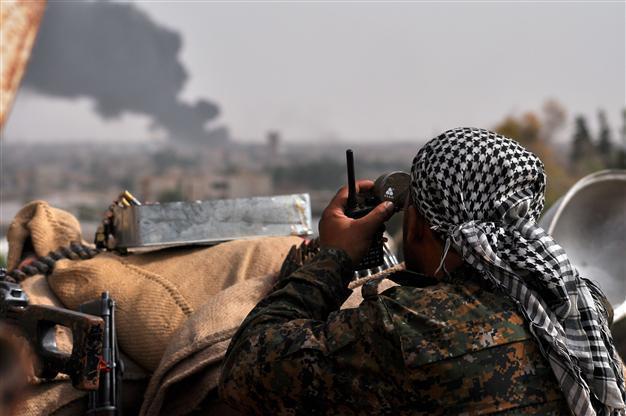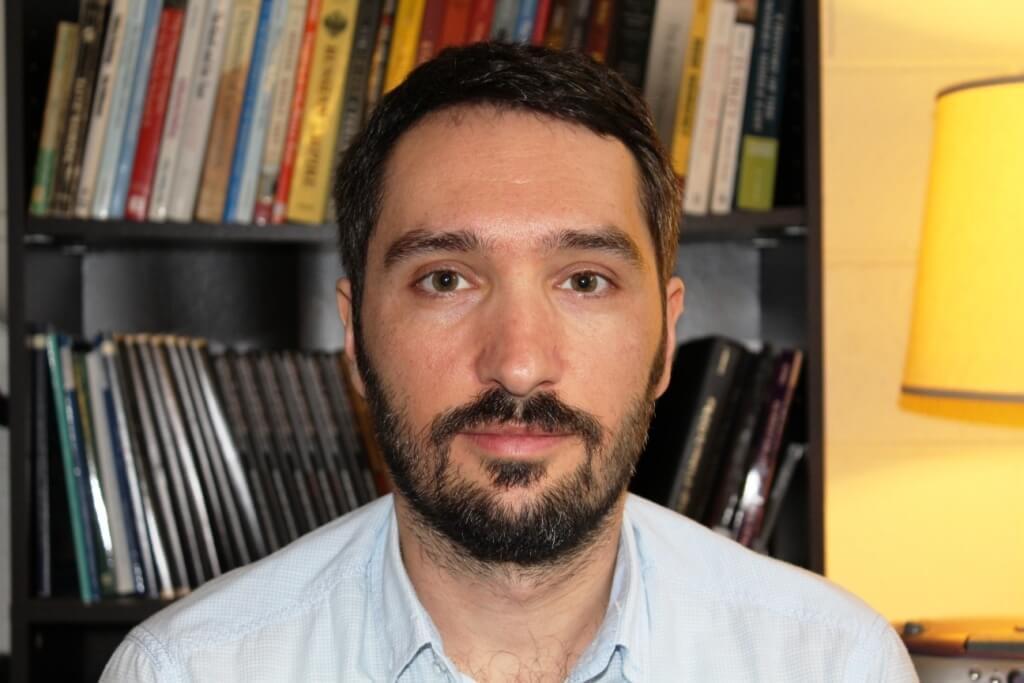INTERVIEW: PKK and Ankara still trapped by decisions taken years ago
William Armstrong - william.armstrong@hdn.com.tr

AFP photo
Turkey’s Kurdish question is once again at a perilous crossroads, amid a fresh wave of clashes between the Turkish military and the outlawed Kurdistan Workers' Party (PKK).With the peace process in deep freeze, it would be foolish to make predictions at such a delicate time. But new book “Zones of Rebellion” (reviewed in HDN here) by Cem Emrence and Colorado University Professor Ayşegül Aydın details a theory of path dependence that suggests certain patterns are likely to persist whatever happens. Decisions taken by both the Turkish state and the PKK years ago have exacerbated the conflict and limited the options of both sides, leading to long-term stalemate.
Emrence spoke to the Hürriyet Daily News about the book and what his research tells us about Turkey’s Kurdish issue today.

Can you give some specific examples of path dependence in the war between Turkey and the PKK?
The basic idea is that both actors - the government and the insurgency - insisted on the same policies throughout the conflict. That’s what we call path dependence. Once you make a choice in anything, as time goes by it becomes harder to reverse. This is what happened in the Kurdish conflict.
Specifically, we identified two sets of policies for both sides that sustained this path dependent relationship. On the government side, the state tried to contain the ethnic threat by creating special administrative regions while also recruiting local allies such as village guards and connecting to various religious orders. On the PKK side, one of the most important issues is what we can call the leadership cult. In the long run, the central position of Abdullah Öcalan in the PKK hampered its territorial expansion. It became very difficult to manage an organization that was trying to expand territorially through the control of just one man. The other thing was that the PKK came up with a nominal ideology about Kurdish identity that ignored or suppressed intra-group differences. In particular, the Alevi identity, the Zaza identity, and the religious Sunni Kurdish identity all became subsidiary as the PKK insisted on a single, monolithic Kurdish identity.
The outcome was that at the end of the Kurdish conflict neither independence nor integration materialized. The Turkish government hoped for integration, the PKK hoped for independence, but neither scenario ended up happening. The outcome has been a stalemate, where a strong state faces a resilient insurgency and ultimately neither can truly consolidate the Kurdish territory.
You discuss in the book how the PKK changed strategy in the 1990s, deliberately cultivating European public opinion. What did this involve and why did it only have limited success?
The PKK’s initial position on the Kurdish issue was to win independence. If you look at Öcalan’s writings before 1993 it is obvious that the PKK rejected two main perspectives: The developmentalist perspective, which said that bringing economic development to the southeast would solve the Kurdish question. It also rejected the “cultural rights” perspective that later emerged in Europe, the idea that giving cultural rights to the Kurds would resolve the problem.
Öcalan was an adamant critic of those two positions until 1993. But then something happened and he changed his ideas. He began to emphasize the importance of propaganda in Europe. The idea was to force Turkey to accept a settlement, an autonomy deal. Why did this change happen? In our book we argue that this turning point occurred simply because the PKK experienced major military losses on the battlefield. By 1993, the PKK was staging more than 900 attacks in Turkey annually. By 1995, this number had dropped to less than 200. The PKK was also suffering many more casualties in the clashes than it was before. So the firepower of the PKK had declined dramatically. It realized that it would not be possible to win the war on the battlefield, so it turned its efforts towards diplomacy and propaganda.
There were a number of resources that the PKK could mobilize in Europe. There were European MPs, NGOs and activists who were interested. There was a Kurdish diaspora that could mobilize for the Kurdish cause. There was also the PKK’s urban wing, which had a strong presence in Europe.
This European path actually has a historical lineage. Claim-making on the political center in Turkey, going back to the Ottoman Empire, has always happened in Europe. Armenian revolutionaries in the 1890s, the Young Turks, the Turkish left, and later the Kurdish left, all used the European sphere to make claims and project their message back to Istanbul or Ankara. By the 1990s, the EU had become a player, while there was a weak Turkish government and economic crises exacerbated by the war. These factors made it more easy and feasible for the PKK to make its case in Europe.
But while this strategy successfully internationalized the Kurdish question, it actually failed the PKK as an organization. The PKK learned the hard way that making the Kurdish question familiar with the international public does not necessarily promote its cause as an organization. The failure of the Kurdish “parliament-in-exile” idea is a good testimony of that point.
You discuss in the book how Kurdish identity formation was part of the conflict: “Insurgencies do not necessarily fight for identities that already exist. Instead, they spend most of their time building new ones. Civil wars can be viewed as incomplete group-making projects.” How did this work in the PKK’s fight with the Turkish military?
There are two ways to understand such conflicts. One theory presents two identities that are pre-given and fixed. When one identity tries to suppress the other it leads to grievance and those who claim the suppressed identity decide to revolt. This perspective assumes that there was a fixed and already-formed Kurdish identity out there. We take a slightly different view. Our book argues that identities are largely shaped during conflicts. The Kurdish conflict shaped, divided and polarized Kurdish identities. It would even be interesting to consider the war as an internal conflict between the Kurds themselves, as well as between Kurds and Turks.
How did identity-formation work during the Kurdish conflict? There are a number of roots. On the one side there was state repression, on the other side there was insurgent violence, and finally there was the political mobilization of the Kurdish ethnic movement. Both the state and the insurgency shaped identity formation by creating “friends” and “foes” in Kurdish society. For example, in over 1,000 village raids, the PKK punished people who they claimed were foes and collaborators with the Turkish state. As for the state, it instituted the village guard system and put 13 provinces in the southeast under emergency rule, which physically separated the experience of Kurds living in these provinces from Kurds living elsewhere.
Other research that we are currently conducting shows how specific instances of state repression over the course of the conflict ended up sharpening Kurdish identity formation.
How has the regional and international situation changed the calculations of both sides?
Regional developments were particularly important for the military aspect of the conflict. The first key period to consider is from the early 1980s up to the 1990s. This was when Syria and northern Iraq were instrumental in hosting rebel leaders, providing military bases, and increasing military supplies to the PKK.
In the second half of the 1990s the political opportunity space shrank for the PKK, especially in northern Iraq. Kurdish leaders in northern Iraq aligned themselves with the Turkish state, which allowed the Turkish military to conduct cross-border operations, assisting military successes at home. If you look at Öcalan’s writings, he is one of the harshest critics of [current Iraqi Kurdistan Regional Government President] Masoud Barzani, arguing that Barzani - in alliance with the Turkish state and the U.S. - effectively destroyed the PKK’s state-building efforts inside Turkey and northern Iraq.
Today, the emergence of ISIL and the Syrian civil war may be opening up a new opportunity space for the PKK. The ISIL advance on Kobane in northern Syria caused Kurdish ethnic political consciousness to reach its highest ever scale. Although some of the protests were violent, they were a demonstration of Kurdish ethnic consciousness at a critical moment.
The Kurdish issue is at a delicate crossroads. What do you expect in the coming weeks?
There is no way of knowing what’s going to happen. Regional developments change very rapidly. But one possible scenario is that the ethnic group’s party, the Peoples’ Democratic Party [HDP], continues to become much more central to the Kurdish movement than the PKK. It has also established allies in the Turkish public. This is a very recent and new development. I looked at more than 10,000 newspaper articles on this subject from the past 30 years, and I have never seen such a level of favorable media coverage for a Kurdish-rooted party. In the past, party officials would be presented in an overwhelmingly negative way, only as “allies of terrorists” or “PKK spokesmen.”
But in the 2015 general election, the ethnic movement essentially tried to “de-ethnicize” itself. It attempted to reframe its message. If it can continue on this road, emphasizing different issues, perhaps even abandoning Öcalan, then it will be on a completely different path. There are big question marks about whether the HDP can actually do this, but it certainly has a chance to do so because it is large, it has public legitimacy, and it has a chance to connect with other groups and constituencies in society. If it doesn’t choose this path, or if other actors force it back to the old position it occupied before, then that will be a situation with the PKK and the state in control again. We would once again see the same old path dependencies that have already led to stalemate.
















